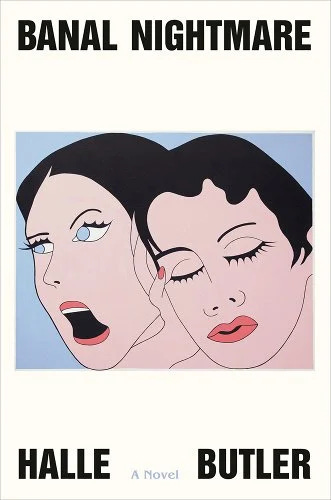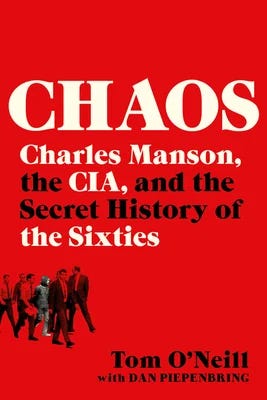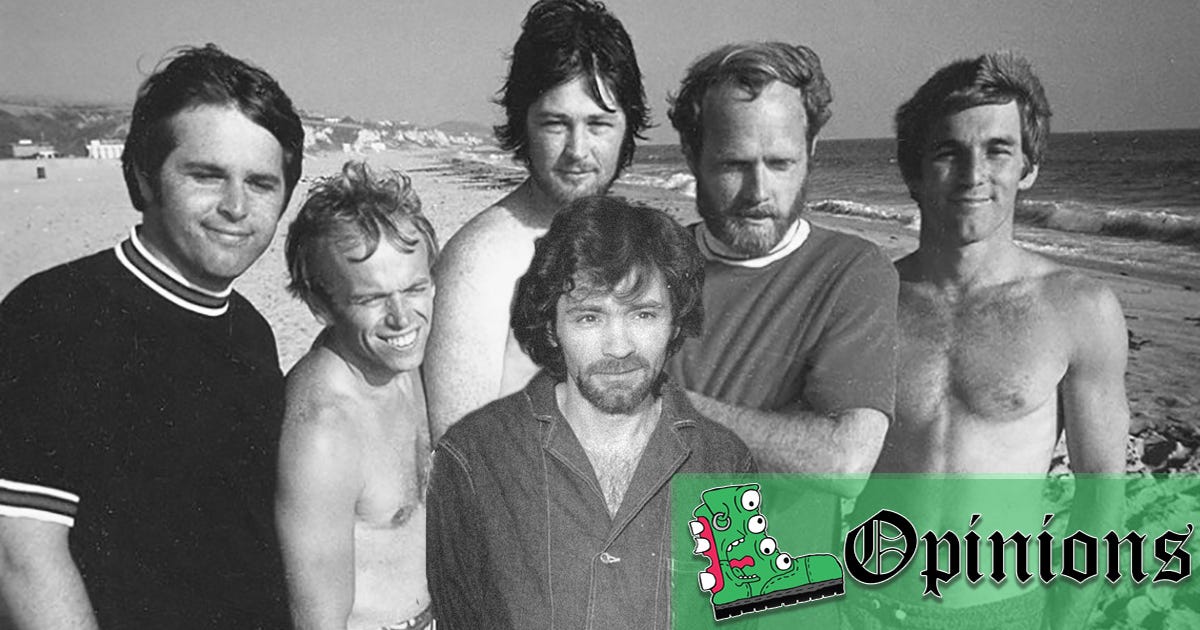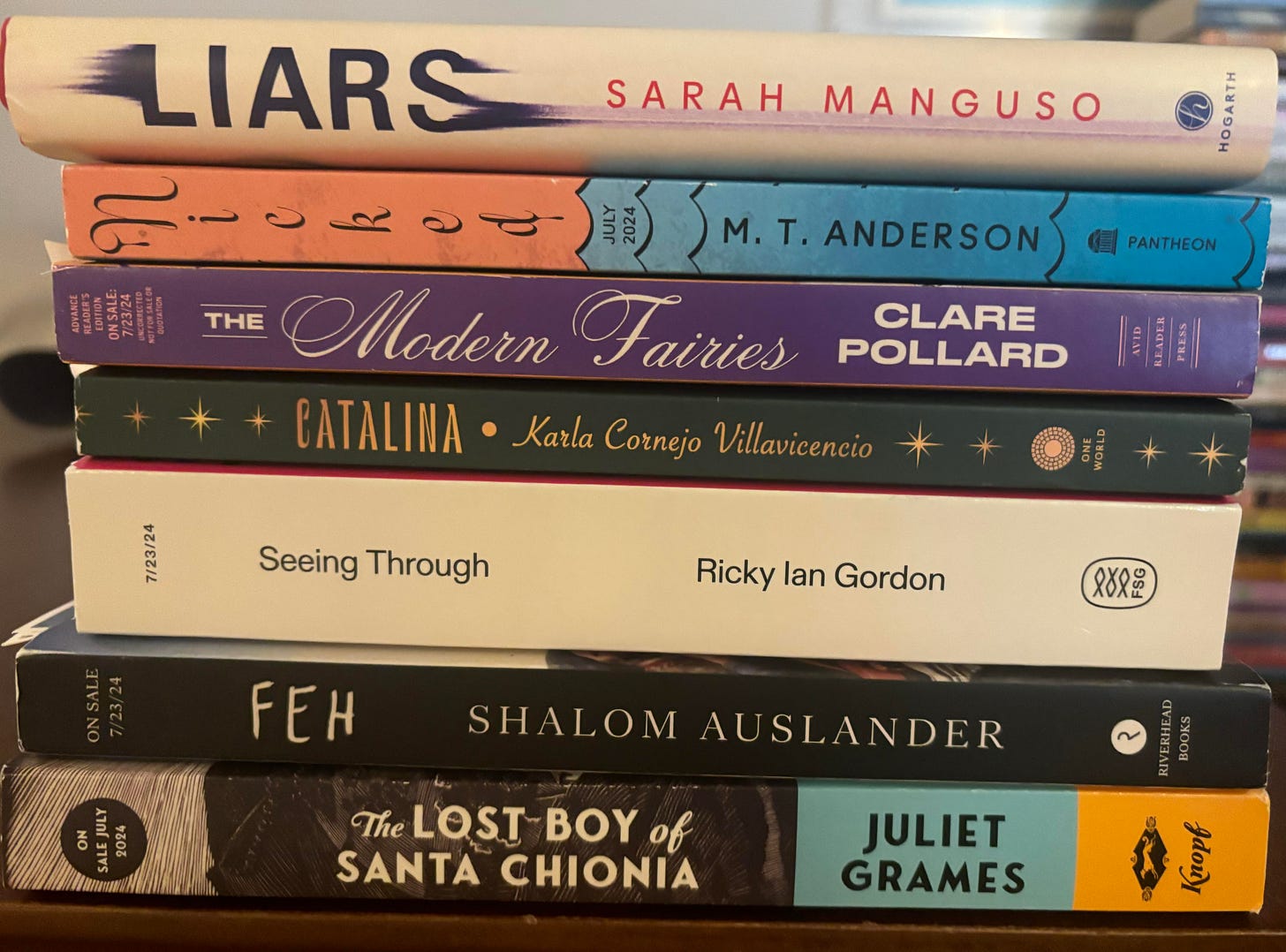What I read this week


Banal Nightmare by Halle Butler
I’m gonna need more people to read Banal Nightmare because it is deserving of robust conversation. At first I didn’t love it as much as Halle Butler’s previous books, because those were about work and I’m fully prepared for office novels to be full of bitterness and the kind of pungent character details that led my friend Hillary Kelly to classify Butler’s novels as Repulsive Realism. But then I realized Banal Nightmare is Butler’s masterpiece, a breakup novel for the ages that slips in some hope just when you least expect it.
The opening 200 pages of the novel are unsparing in their unbridled misanthropy, as our heroine Moddie returns to her Midwestern hometown from Chicago after she ends a longterm relationship and realizes that everyone and everything sucks. We see this play out not just in Moddie’s copious observations (Butler’s social satire has sharp teeth, and even Moddie’s most random rants are culturally astute and/or enjoyable ) but also from the points of view of some of the other people in town. Wow, they all seem miserable. Their romantic relationships in particular feel joyless, so that three separate couples have fights that hit the same notes: barely concealed loathing, frustration over domestic duties, fantasies of escape and revenge.
The collective misery almost becomes too much. Or it almost became too much for me to handle at this particular point in my life. When I was Going Through It as a younger woman I can see how this misery would feel comforting, companionable. Which is why Banal Nightmare is the perfect breakup book for someone who needs time to stew, to feel disgusted with the world. Very valid.
Just when I began to lose faith in the whole, harsh enterprise, things start to turn around for Moddie (but not too much). Just enough to remind us that sometimes things can turn out to be kind of okay. It made the novel feel more complete, more profound. Highly recommend.
The Thursday Murder Club by Richard Osman
I had Covid all of last week, the FLiRT variation, which is not merely as fun as the name implies. I wanted a little something cozy to listen to, and the audio version of TTMC sufficed. The TV adaptation with its A-list cast looks amazing.
Chaos: Charles Manson, the CIA, and the Secret History of the Sixties by Tom O’Neill with Dan Piepenbring
I always thought Helter Skelter was the definitive account of the Manson murders. That’s how the 1974 book by Manson prosecutor Vincent Bugliosi was marketed, at least. But when Tom O’Neill, a reporter for the now defunct entertainment magazine Premiere was assigned a small story in 1999 on the 30th anniversary of the murders, he began to question what turned out to be just about every detail from Bugliosi’s account. His small assignment turned into a 20-year investigation of some of the things that happened in the summer of 1969 that didn’t make it into the pages of the book. (he ended up getting a monthly research stipend from Premiere while it was still in business).
But don’t expect answers. “My goal isn’t to say what did happen,” says O’Neill, “it’s to prove that the official story didn’t.”
From my spot as a critic of the publishing industry, the idea that an author could ignore details to make his narrative work better is more than probable. Fact-checking was and has always been the author’s responsibility, which means it often doesn’t happen. From the publisher’s POV, Bugliosi was intimately tied to the case so his facts must be right. Right? Absolutely not.
Chaos starts off seemingly as an attempted fact check of the official accounts of the murders, and then goes off to the darkest corners of conspiracy theories: MKUltra and mind experiments and sketchy CIA operations. You don’t have to buy into every theory to enjoy the book; it’s kind of an amazing choice to let the writing get more and more paranoid as the book progresses. You’re on a ride with an author who is increasingly obsessed, and there’s a thrill in that. Does the book always make sense? Nah. But who cares?
Chaos doesn’t purport that Charles Manson was framed, or that he was not responsible for any of the violence that surrounded him and his Family. My takeaway is that Manson was likely more of a Jeffrey Epstein type than a random crazy dude: connected to very powerful people who had a very good reason to not want to be a part of his story. And if the Jeffrey Epstein case was a conspiracy nut’s ultimate validation that shit like this really does happen, who’s to say it couldn’t have happened before?

Why is Chaos Consistently Back in the Top 25 Bestselling Books On Amazon?
Now it’s time to talk about how Chaos has found new success, the one older book that is newly back on the Paperback Nonfiction Bestseller List that is not Hillbilly Elegy.
Here’s what happened: I had just started reading Chaos when I was trolling around on Amazon, and noticed it was at number 17 on the Top 100 Books list. Chaos was published by Little, Brown in 2019, it was a back burner book that I was only just getting around to, so I was surprised.
There didn’t seem to be any big recent media hits that I could find. I began to wonder if it was a TikTok phenomenon, but research didn’t really pan out. So I did what I always do when a google search doesn’t lead me to any answers: I asked Twitter.
I found out that on May 10, 2024, Candace Owens endorsed the book on all of her social media channels (she has 5 million followers on Instagram and Twitter, so this is not insubstantial). Thank you for the assist, Isaac.
But still! Chaos didn’t make an appearance on the New York Times bestseller list until June 30th. So no, Candace Owens is not as powerful an influencer as, like, any of the celebrity book clubs.
I still couldn’t find an answer, so I asked O’Neill’s lovely publicist Katharine Myers. She told me that Chaos had just been touted by Jessica Reed Kraus, a former mommy blogger turned far right political gossip monger (she has 430,000 followers on this very platform) of whom I was blessedly unaware.
So the recent success of Chaos appears to come from word of mouth spreading in communities I usually don’t pay much attention to: far right conspiracists and the trolls who love them.
That said, it’s kind of amazing that a book exists that already features praise from both BookForum and The Ringer, Joe Rogan and The Federalist. This is the holy grail: to appeal to such a disparate set of readers. How lovely that Chaos brings us all together in our distrust of the American legal system.
The renewed success of Chaos really brings home how the ways people learn about books have changed: traditional outlets don’t have the same impact and social media is more dispersed. It’s above my pay grade to speculate whether this is good news or not.
Things I wrote this week
I contain multitudes
Lit Hub: A Little Explanation of My NYT 21st Century Books List Ballot
Vulture: Shannen Doherty’s Most Essential Beverly Hills, 90210 Episodes
New releases, 7/23/24
Liars by Sarah Manguso
Nicked by M.T. Anderson
The Modern Fairies by Clare Pollard
Catalina by Karla Cornejo Villavicencio
Seeing Through: A Chronicle of Sex, Drugs, and Opera by Ricky Ian Gordon
Feh by Shalom Auslander
The Lost Boy of Santa Chionia by Juliet Grames
On the new VP candidate’s book
Keep reading with a 7-day free trial
Subscribe to The Maris Review by Maris Kreizman to keep reading this post and get 7 days of free access to the full post archives.




